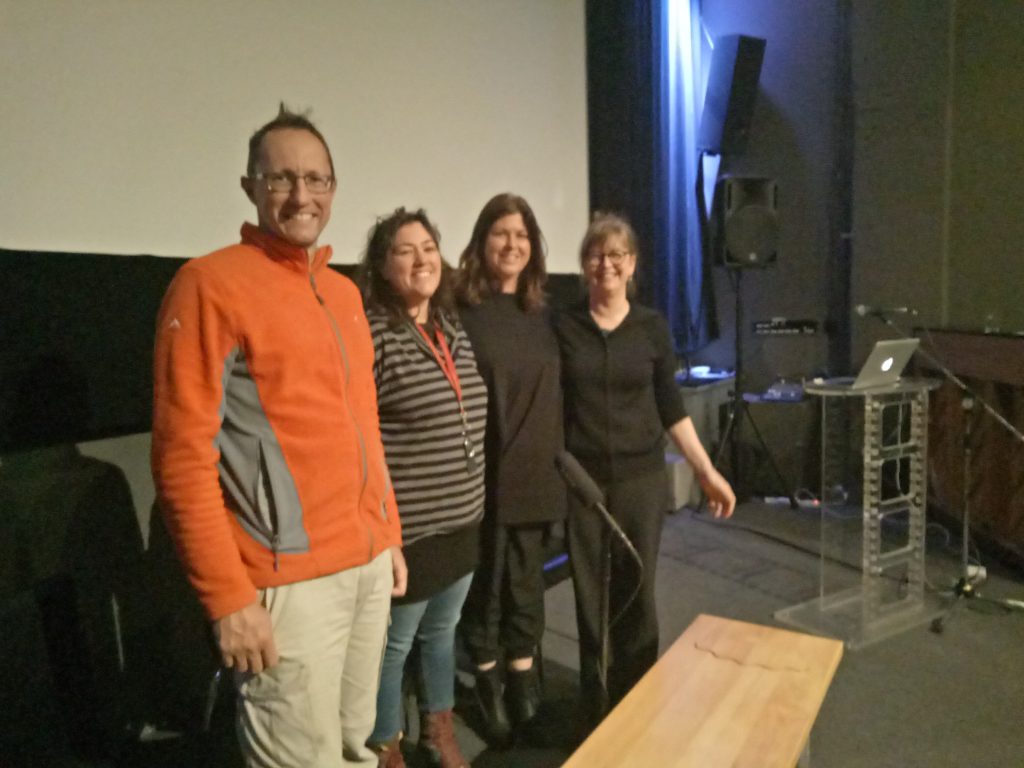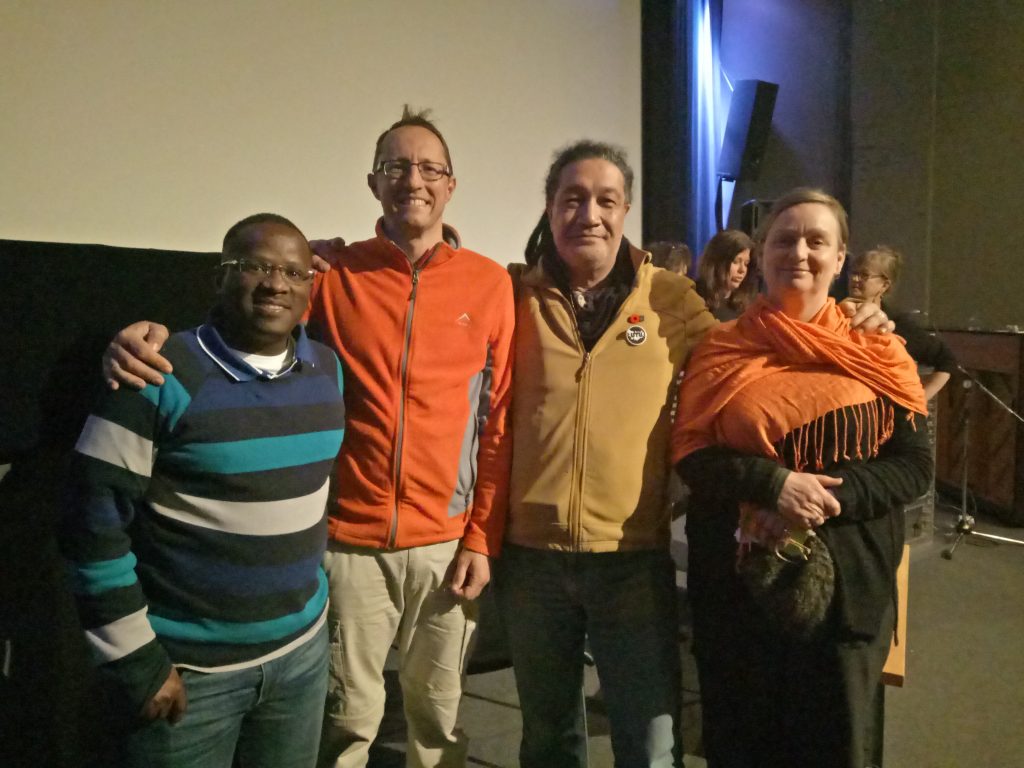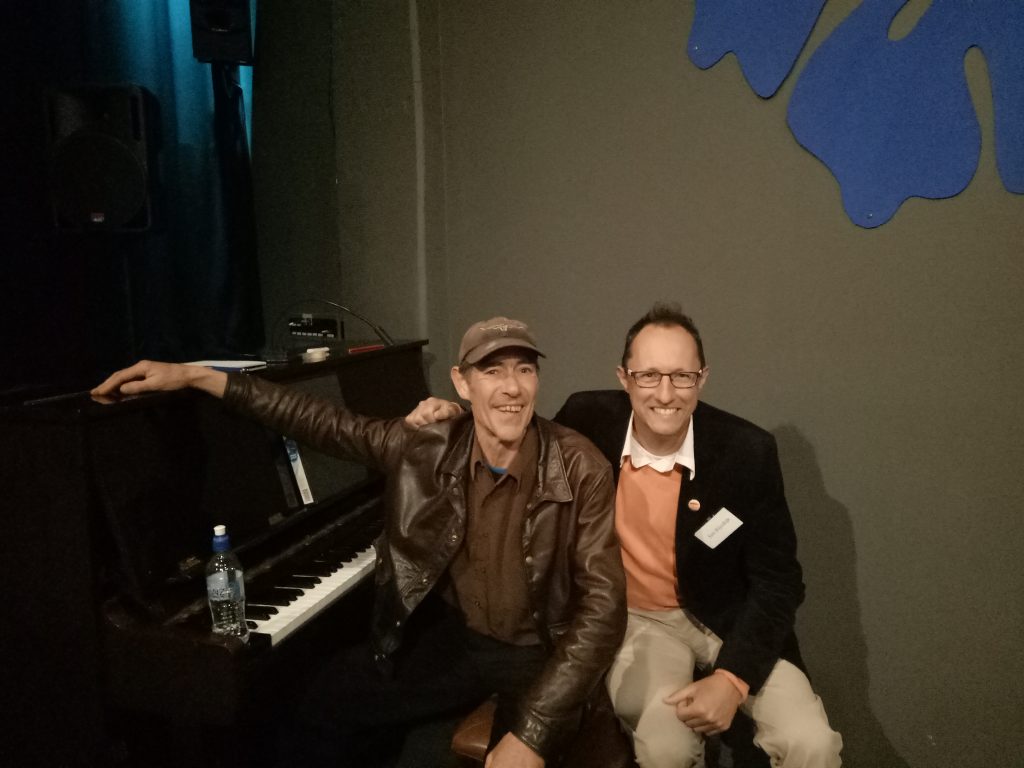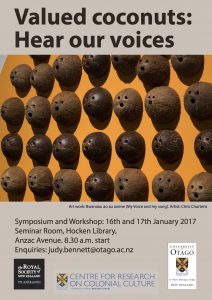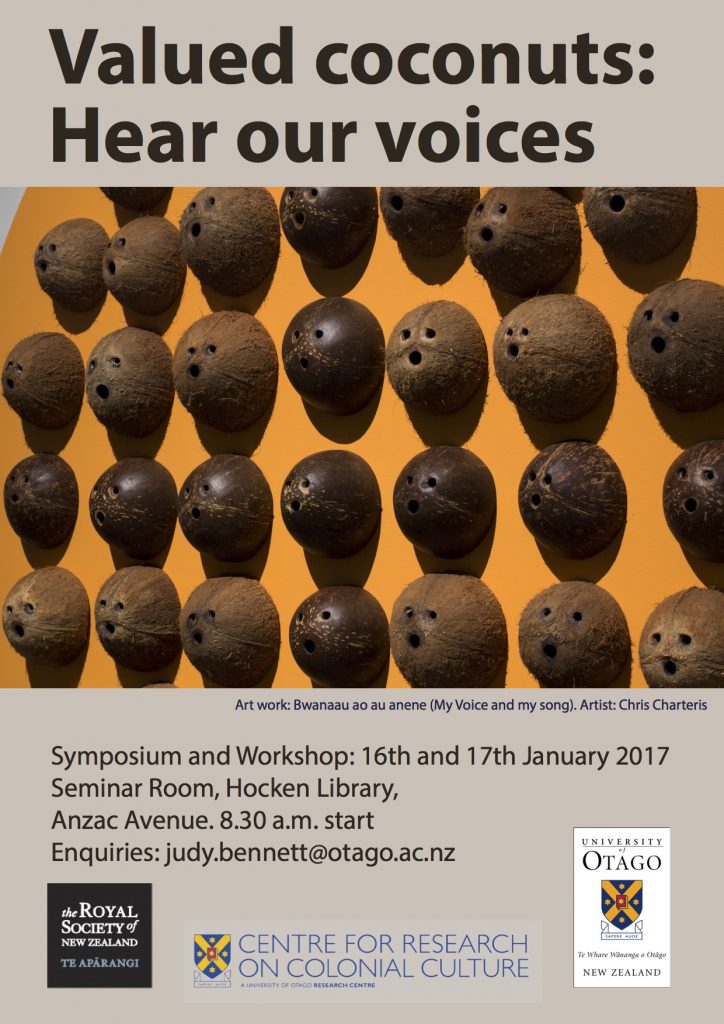Scotland’s Colony?
The Centre for Irish and Scottish Studies is hosting a one-day FREE symposium at the Hocken Collections on Monday 16 December from 9.30am on ‘Rethinking Otago’s Caledonian Connections’. There’s a great line-up of speakers and topics, which are listed below.
Session 1 (9.30-10.45): Texts and Contexts
Catriona MacDonald (University of Glasgow)
‘Exporting the past, historicising the nation: making histories in Scotland and New Zealand’
Ben Wilkie (CISS, Otago)
‘Scotland’s Antipodean Archipelago: The Otago Settlement and its Australasian Context’
Session II (11-12.15): Scottish Institutions in Otago and New Zealand
Valerie Wallace (Victoria University of Wellington)
‘Scots Law and British Colonialism in New Zealand’
Liam McIlvanney (CISS, Otago)
‘Scottish Presbyterianism in Early Otago: Thomas Burns and D.M. Stuart’
Session III (1.45-3): Print Culture Between Scotland and Otago
John Stenhouse (Otago)
‘Sam Lister, the Otago Workman Newspaper and Denominational Tensions in Late Nineteenth-Century Dunedin’
David Goldie (Strathclyde)
‘From Lee to Lea: Imperial Hybridity in Scottish and New Zealand Poetry of the First World War’
Session IV (3.15-4): A Roundtable discussion on Scotland’s Colony? To what extent was Otago a Scottish Colony? How does Otago complicate our understanding of Scotland’s involvement in Empire?
CFP: Translation and Transculturation in, through, and by Print
The University of Otago’s Centre for the Book has announced a Call for Papers for its seventh annual research symposium, which will be held on 1-2 November on the theme “Translation and Transculturation in, through, and by Print”. The keynote speaker is CRoCC member Associate Professor Lachy Paterson, an expert on Māori newspapers and transculturation.
Call for Papers: Translation and Transculturation in, through, and by Print
1-2 November 2018
Relevant topics might include, but are not limited to:
• The impact of print in NZ in languages other than English
• The impact of print in scripts other than the Roman alphabet
• Collectors and collecting across cultures
• How books travel from one language to another
• Whether transculturation is separable from translation, i.e. can ideas travel irrespective of language?
• The extent to which print communicates across cultures more or less effectively than other media
• The effects of national language policies on the power of translation
• Any aspect of technologies for cross-cultural printing and/or translating
• The extent to which print records or distorts cross-cultural encounters
• Motivations for translation (evangelisation, education, propaganda, support)
• Whether translation inhibits or facilitates transculturation
All of these topics are of potential interest for the Centre for the Book symposium. Please email a 250-300 word abstract to books@otago.ac.nz. Abstracts must be received by 1 September 2018.
If you have any questions, please contact Dr. Donald Kerr (donald.kerr@otago.ac.nz) or Dr. Shef Rogers (shef.rogers@otago.ac.nz).
Film in the Colony
The Film in the Colony Symposium, held at Ngā Taonga Sound and Vision, Wellington, 13-14 July, produced some great discussions and a fine array of films in the face of some wild Wellington weather. The symposium focused on the convergence of film, film-making, the emergence of nation and interactions between peoples in colonial contexts, with an emphasis on New Zealand, South Africa and Australia. The symposium opened with two screenings on Wednesday night: Edward Curtis’s In the Land of the Headhunters (1914; Aaron Glass who was involved in the restoration of this film provided us with a commentary in the form of a recorded powerpoint), and Charles Chauvel’s Jedda (1955), introduced by Tasha James from the Australian National Film and Sound Archive.
The opening keynote speaker on Thursday, Ian-Malcolm Rijsdijk, began with a fabulous map, charting the world as it was filmed in Southern California, and, pointing out where ‘beginning with the question of how film ‘takes place’ in particular locations, moved to a wide-ranging discussion of cinema and decolonisation in South Africa, particularly in the light of the unrest currently dominating South African campuses. How do we make the archive of colonial film valuable to students trying to move away from colonial thinking? How to make it meaningful, and to find a language for discussing it? His point that colonialism is a structure, not an event, was one many found compelling.
From here the focus switched to New Zealand’s early cinema, with Minette Hillyer’s rich account of the visit of ‘Paramount’s Red Indians’ to Rotorua in 1927, and Mark Derby’s discussion of Gaston Melies’ film-making enterprise in the South Seas in 1912, which set us up well for a documentary on Melies’ tour of the Pacific and South East Asia. Alex Porter charted a journey in the other direction, with Len Lye’s departure from New Zealand to London via Samoa, a trip which resulted in his remarkable Tusalava of 1929 – which we then had the privilege of viewing.
Three papers with very different takes on Rudall Hayward’s silent The Te Kooti Trail of 1927 followed: Jani K Wilson compared two of the film’s Ngāti Awa audiences, the second including members of her own hapū; Brendan Sheridan discussed kūpapa in New Zealand Wars films; and Annabel Cooper investigated some of the film’s imagined and real communities. These papers were followed by a screening of the film brilliantly accompanied by pianist Nikau Palm – a treat followed by dinner at Siem Reap.
Friday began with a panel discussion which brought together Honiana Love (Te Ātiawa) and Lawrence Wharerau (Ngāpuhi) from Ngā Taonga with Natalie Robertson (Ngāti Porou), who combined discussion of the evolving relationships between whānau, films and archives, with commentaries on a sequence of films. Natalie, whose whānau appear in the film, talked us through James McDonald’s Scenes of Maori Life on the East Coast, enriching the film with her information about who the people are and where, the significance of their filmed work, and the signs that they were performing their customary labour for the camera, rather than simply going about daily activities. As we watched the Ahipara Women’s Fire Brigade rally to community defence, and fertiliser spreading on Te Puea’s Farm, Honiana and Lawrence discussed the archival detective work of finding out about films and the relationships developing between the archive and communities.
The session on sound brought together Mel Cross’s illustration of how Alfred Hill’s score affords a specific Maoriland resonance to Hayward’s Rewi’s Last Stand (1940); Allison Craven and Ben Palmer’s investigation of the voices of Aboriginal people in Charles Chauvel’s Uncivilised (1936); and – in a return to Rotorua – Aleisha Ward’s account of the contentious production of the first jazz film made in New Zealand, (a publicity film for Epi Shalfoon and the Melody Boys).
Megan Tamati-Quennell gave us an introduction to Lisa Reihana’s Native Portraits N.19897, which had screened through the symposium, and was followed by Felicity Barnes’s elegant revival of a neglected genre, the trade film in Australia and New Zealand. Offered a sample (Captured Sunshine), we wondered with 21st-century amazement at their bygone popularity.
Litheko Modisane closed with an analysis of the career of South African actor Ken Gampu, whose career spanned the apartheid and post-apartheid eras. Gathering up some of the larger themes of the symposium, Litheko asked how audiences could now view Gampu’s earlier work – how can a decolonising society appreciate the colonial legacy, and what vocabulary is there for analysing it. Litheko’s analysis of the complexities of Gampu’s role in Dingaka (1964) was followed by a closing panel and then screenings of Dingaka and Rewi’s Last Stand.
CRoCC would like to extend warm thanks to those who helped organise the symposium: Diane Pivac, Honiana Love and Lawrence Wharerau (Ngā Taonga), Minette Hillyer and Jo Smith (Victoria University of Wellington), Sue Lang, Helen O’Sullivan and Bronwyn Craig (University of Otago).
Annabel Cooper
CfP: New Histories of Pacific Whaling
Call for Papers
New Histories of Pacific Whaling
An International Symposium co-sponsored by the Rachel Carson Center, the University of Oregon and the Centre for Research on Colonial Culture, University of Otago, New Zealand
University of Hawai’i – Mānoa, June 29 – 30, 2018
Emerging historical scholarship is upending older work on whaling and showcasing it as an ideal medium with which to investigate human relationships with the oceans and with each other. Whales offer investigative bridgeheads into the cultural histories of non-human species, the hidden histories of energy economies, and the complicated histories of cross-cultural contact. Whale histories are demonstrating to environmental historians the various scales, including oceanic scales, with which they can work and are challenging them to consider new forms of evidence and new tools of interpretation. This international symposium aims to bring together the excellent, scholarship integrating the history of Pacific whaling with environmental and cross-cultural history. We seek participants from around the world to convene next year at Honolulu, the center of the Pacific whaling industry. We especially welcome scholarship that engages Pacific and environmental history and examines the crucial linkages between whaling, animal histories, indigenous histories, capitalism, diplomacy, environmental change, and globalization.
Participants will be expected to pre-circulate drafts of works in progress in advance of the symposium. Selected papers will be published as a special issue of Rachel Carson Center’s Perspectives. Travel and lodging costs will be covered by the seminar sponsors.
For those interested, please email 250-word paper proposals along with a short cv to the symposium conveners by September 1, 2017
Ryan Tucker Jones, University of Oregon rtj@uoregon.edu
Angela Wanhalla, University of Otago, angela.wanhalla@otago.ac.nz
Film in the Colony Draft Programme Available
A Draft Programme for the forthcoming Film in the Colony Symposium is now available. Registration details as well as a registration portal will be provided soon.
Symposium on Individual Rights and Biopolitics
A symposium on “Individualism versus Collectivism in New Zealand and the British Empire: Individual Rights and Biopolitics” is being held at Victoria University of Wellington on Saturday 8 April (click on the Programme for further details). It features talks from leading New Zealand historians, including two from the Centre for Research on Colonial Culture: Barbara Brookes and Jane McCabe. Even better, the symposium is free! If you are interested in attending please contact Professor Charlotte Macdonald (charlotte.macdonald@vuw.ac.nz) to register.
Rage Against the Machine Symposium
On April 8, Victoria University is hosting the symposium Rage Against the Machine: Biopolitics, Individualism and Collectivism in 19th Century New Zealand and the British Empire in Wellington.
At the event, discussion is invited around the subject of the current comparative research project on individualism vs collectivism of Fulbright Scholar Anna Clark (University of Minnesota). Responses to the themes, topics and questions posed by the project are warmly invited.
For more information on Professor Clark’s project and the symposium, click: RageAgainsttheMachineSymposium
VUW Contact: Charlotte Macdonald, tel + 64 4 463 6761, charlotte.macdonald@vuw.ac.nz.
REMINDER: CFP, Film in the Colony Symposium
Don’t forget the Film in the Colony Symposium, to be held in Wellington, 13-14 July.
https://blogs.otago.ac.nz/crocc/film-in-the-colony-symposium/
If you are interested in presenting a paper, send a 200-word abstract and a brief bio to: filminthecolony@otago.ac.nz by 28 February 2017.
Valued Coconuts
Scholars in Pacific history and culture met to share their knowledge on the use and economies of the coconut in a symposium on Monday and Tuesday this week in Dunedin, the first event in what looks like a busy year for the Centre. Professor Judy Bennett organised and hosted the Valued Coconuts: Hear Our Voices symposium and workshop as part of her Marsden project, Constant Coconuts: A History of a Versatile Commodity in the Pacific, and with support from CROCC.
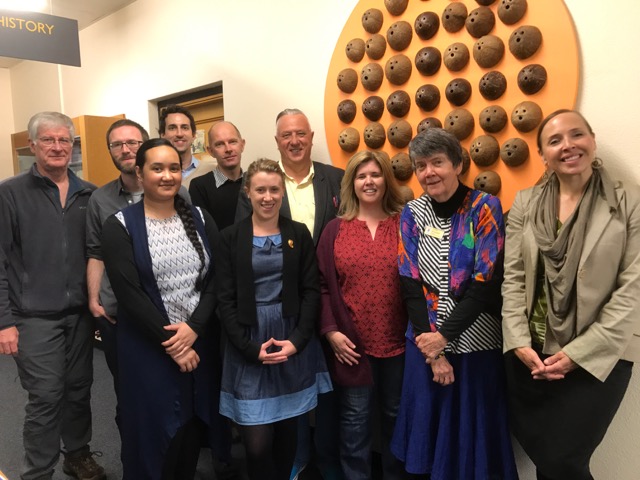
From left: Steve Talley, Josh Levy, Toaga Alefosio, Holger Droessler, Adrian Muckle, Kate Stevens, Lachy Paterson, Angela Wanhalla, Judy Bennett and April Henderson.
Valued Coconuts was a pre-read workshop featuring six papers. April Henderson and Toaga Alefosio’s (Victoria University of Wellington), On Skin and Bone: Samoan Coconut Oil in Indigenous Practice discussed how coconut oil is used in the continuing Samoan practices of fofō (healing massage), samaga (tattooing) and liutofaga (cleaning of ancestors’ bones) and the meaning for people today. This paper comes of out of summer scholarship for Toanga (who will be an Honours student this year) and April’s current research on virgin coconut oil use, “Kernals of Hope: Following Coconut Commodities from the Pacific to the West” supported by a Royal Society of New Zealand Marsden grant. In the second paper, Wasting coconuts? Consumption versus commerce in Wallis and Futuna, Kate Stevens discussed how French colonisers’ desire for scientific production of copra clashed with the Indigenous people’s views on the value of coconuts. Kate is a postdoc in Otago’s Department of History and Art History, working with Judy on their Marsden project.
Josh Levy is a PhD student at University of Illinois, Urbana-Champaign, who is researching the successive colonial regimes on Pohnpei through food history. His paper, Ideal coconut country: Persuasive coconuts and the scientific plantation in Pohnpei, Micronesia, looked at the German colonial period and the effects of copra production on the Pohnpeian population. Steve Talley, an Otago PhD student’s paper set to Defining indigenous entrepreneurship in the New Hebrides copra trade, and how the opportunities and constraints of the French and British rule moderated the Indigenous peoples’ engagement in the coconut trade.
Holger Droessler‘s Coconuts in Samoa explored how the cultivation of coconuts and production of copra mediated the German colonisers’ attitudes to Samoans, and how Samoans were able to maintain a subsistence economy despite the German desire for greater productivity. Holger is a Visiting Assistant Professor of History at Bard College in New York state. In the last paper, Judy Bennett’s Voices of Rotuma: Enduring Refrain examined the copra trade of Rotuma both in the colonial and post-colonial eras and tensions brought about through the necessity of having to ship its copra through Fiji.
Centre members, Angela Wanhalla and Lachy Paterson, acted as commentators for these papers alongside Adrian Muckle from Victoria University of Wellington. The format of the symposium allowed for extensive discussion of the papers; the plan at this stage is for all the papers to be incorporated into a special journal issue. Thanks to the Hocken Collections for providing the venue for the event, and for the tour of some of their Pacific material. Thanks also to the Otago Museum for a tour of some of its coconut-related holdings.
Forthcoming Symposium. Valued Coconuts: Hear Our Voices
Prof. Judy Bennett is convening a pre-read symposium at the Hocken Collections on 16 & 17 January 2017. It is a key outcome from her Royal Society of New Zealand Marsden Project with Dr. Kate Stevens, Constant Coconuts: A history of a versatile commodity in the Pacific World.
This symposium focuses on six pre-circulated papers. They address different Pacific sites in regard to the history of a range of Indigenous interactions with coconuts in everyday life as well as a commodity. In addition to considering the variety of Indigenous voices, most papers also examine interactions of colonial agents—administrators, traders, planters, and mission organisations—with this commodity in the form of coconut oil or copra. There are to be assigned commentators for each paper, but presenters also have 20 minutes each to introduce and discuss their research to the wider audience.
All are welcome to attend and contribute to the discussions where appropriate. For more information contact Judy Bennett (judy.bennet@otago.ac.nz)

